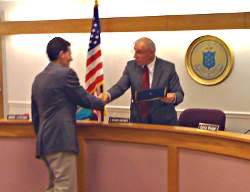Portsmouth schools narrow projected budget gap
 |
| PMS teacher Erin Escher congratulated by chair Dick Carpender. |
The Portsmouth School Committee outnumbered the residents in attendance for most of Tuesday night's meeting — and one member was absent. It really was kind of a shame, because there several pieces of very good news.
First, middle school science teacher Erin Escher was congratulated by the committee for winning the Amgen Award for science teaching excellence. Escher told the committee about his winning lesson, a highly hands-on field trip to a salt marsh. "The kids love it. They make connections to what we learn in the classroom," said Escher. "It's amazing how many sudents have nevrer been to a salt marsh. I don't think they blink the whole trip, they're so excited."
Then Supt. Susan Lusi and Asst. Supt. Colleen Jermain reported back on progress during this first year of the five-year strategic plan, and of the 86 objectives developed from last year's Future Search conference, significant progress had been made on 79, which Chair Dick Carpender noted was a solid 92%.
"This is a plan on which we've made enormous progress," said Lusi, as she and Jermain stepped through examples of the work done to date by the members of administration and staff who had signed up to lead one of the topic areas at the beginning of the year. Jermain addeed that it wasn't just about sitting in meetings and talking. "We have online communication and online tools," said Jermain, enabling teams to collaborate virtually.
In the area of individual learning plans, for example, the district had already presented their preliminary thinking to the RI Dept. of Ed (RIDE) who were reportedly "very pleased." The first year of the new technology plan — with the exception of hiring a new support person — was also solidly in the green column, as was the development of a five-year curriculum review process, and building partnerships with the business community.
Some of the items on the dashboard, of course, were not complete. Developing a completely new review process for teachers, for example, had been scaled back pending the results of the state-level evaluation update RIDE announced last year. "Given that, we talked about fact that we don't want to invest a whole lot of staff time in developing a tool," said Lusi. "What we did was tweak [the evaluation rubric] to be more clear about what we will look at next year." Updating the school library collections, another "orange" item, is underway, but will require more work, since the team determined that matching the Massachusetts standards for up-to-date collections would cost the district over $150K. Said Jermain, "That's something we still have to work out [to do] within our budget."
The other good news was around the projected gap in next year's budget. Thanks in part to some good news in the transportation contract, finally unsealed by the state, the original shortfall, projected to be $877,669 had now shrunk to just $141,901.
Part of that is greater savings associated with the closing of Elmhurst. "This will have more impact than we originally thought," said Finance Director Mark Dunham, who estimated that the first year would save the district $150K after accounting for one-time moving costs, and that the run-rate savings would be closer to $200K/year.
While the gap still exists on paper, for those of us who've been watching these budgets for the past few years, a number in the $150K range is not scary. As Dunham said, "We still have work to do, but we're working toward it."
In other news, the committee renewed the food service contract with Chartwells for the second year of their five-year term. There was some discussion of the lower profit-sharing (the contract now guarantees a minimum of $8K to the district, down from $26K, reflecting perhaps more pessimism about the revenue, with less kids buying the "healthier" lunches with whole-wheat pizza and bread. "The [health] guidelines certainly made the food less appealing," Dunham noted.
The committee also ratified a $23K one-year support contract for the school information system, SchoolMax, which is no longer being supported by the state technology group, RINET. "We investigated other systems," said Lusi, but were concerned because RIDE may require a standard system for all districts. "It would have been a sizable investment, and we're not comfortable recommending it at this time."
There was also discussion of an innovative approach to make money and make kids safer by installing cameras on school buses to catch offenders who pass while the red lights are flashing. "It's a $300 fine," said Dunham, "And 25% is split between the municipality and the school district." The vendor would assume all the capital costs, making it a zero-outlay option for the district.
But PCC President Larry Fitzmorris didn't like the idea. "I hate to rain on people's parade, but this is not a matter for the school committee; you do not have a portfolio for traffic surveillance," said Fitzmorris. He also objected to the notion on privacy grounds. "Maybe it's just me, but I don't like to be surveilled."
Okay, I'm no fan of random surveillance either, but really. Do we feel the need to protect people passing stopped school busses? It couldn't be that we don't want any extra revenue coming in for the schools, could it?